#Chess for Young Beginners
Explore tagged Tumblr posts
Text
Just today I got to see a chess book that I remember reading as a little kid. While it didn't give me a lifelong passion for chess, it did give me a lifelong passion for fantasy for its artwork.
The book is "Chess for Young Beginners" from 1975, and here's some of the artwork:


Like, this artwork goes hard. I especially appreciate the colour scheme for the black pieces, with its browns, bronzes, reds and oranges.



This artwork is amazing, evocative, exciting and dramatic. I recommend giving it a look if you have a chance - you can probably scrounge up a PDF of this thing with a bit of searching.
35K notes
·
View notes
Text

Online chess training for kids boosts focus, strategy, and critical thinking-making learning fun, engaging, and convenient from the comfort of home.
Do Visit: https://chesstrainer.com/why-online-chess-training-is-perfect-for-kids-young-learners/
#Online chess training for kids#Chess coaching for young learners#Benefits of chess for children#Virtual chess classes for beginners#Kids chess programs online#Cognitive benefits of chess#Best online chess courses for kids#Chess and brain development#Fun and interactive chess lessons#Improving problem-solving skills through chess#Why online chess training is great for children#How chess improves critical thinking in kids#Best platforms for kids to learn chess online#How online chess classes boost focus and memory#Affordable online chess training for young learners
1 note
·
View note
Text
Matchup Exchange
For @ethereal-moonglow
Your HSR match is...Jing Yuan!



I hesitated between Jing Yuan, Aventurine and Sampo! In the end Jing Yuan won because he’s more stable than the other two. Is it ironic that I say that knowing I love red flags? Yes but we shall not speak about that.
Now for the meeting… you got involved with a mentorship program for young Cloud Knights-in-training. You weren’t an official soldier, but your ability to connect with kids, your strategic mind, and your natural leadership made you an excellent tutor in basic battlefield psychology and adaptability. He was curious and decided to come in and observe the program in person but in a very bad disguise. Ditching his uniform and wearing a wig isn’t enough. And also who would expect him to do something like this? Isn’t he normally always busy? Apparently not. And it’s totally not because his kid is in the program nooooo
You figured out his identity pretty fast. I mean…golden eyes? Very advanced answers for a so called beginner? Check. Come on he’s no fooling anyone. Not even the kids cuz when you challenged him with a follow up question he responded effortlessly, like he was teasing you. The back-and-forth turned into a full-on debate, with the kids watching in fascination. Some connected the dots and you gaslit them into thinking otherwise. Needless to say, you two had a meeting after hours as to what on earth compelled him to do this? Doesn’t he trust your reputation? More at 9 because the quality of his answers might make him face an angry instructor.
Jing Yuan being the gentleman he is invited you over for tea. At least he got good taste. His excuse for such a bad costume and infiltration?
“There has been some rebellions in the youth lately. It was traced back to their instructor. Now, making Yanqing join the program was planned. But you can’t blame a guardian for being worried am I right? Not that you are suspicious lady! I was just worried about my child…Now that I’ve met you I’m jealous that he gets to spend so much time with you”
Real smooth Jing Yuan. Crisis averted, and it was totally not because the food was good. During that dinner both of you warmed up to each other and ended up cracking jokes. But there was one question…who’s the best smooth talker? Sorry but I believe he wins. Good luck making him blush!
Now how you two got close…. Jing Yuan found you fascinating. Someone who could keep up with his wit, challenge him, and wasn’t immediately intimidated by his status yet respectful? Of course he wants to develop a friendship or at least build up good relations! So naturally, he started visiting the mentorship sessions more often, using the excuse of “evaluating the program.” His visits became a routine. Sometimes he joined the lessons. Sometimes he just watched you work, secretly enjoying your energy and playfulness. It all escalated till one day Yanqing was complaining that your puzzles were too difficult! He even said jokingly that you might be the only one able to beat Jing Yuan in a game of chess. Jing Yuan has his own ego and is now curious about your level in chess…that’s why he invites you for a game. At the end of the game he saw you in another light…for such a mature and professional tutor, you sure as hell is chaotic! You didn’t playing traditionally. No, your gameplay is chaotic, spontaneous, and you made risky moves that shouldn’t have worked but did. In the end he won but he knew that you were gonna ask for a rematch and train to get better.
“I haven’t had a match this enjoyable in years…would you humor me with another?”
More matches came and he didn’t realize how at ease he felt with you. Till one day, he walked into a wall while watching you. That’s when the general knew he was smitten. It didn’t take long for him to confess. Well it depends how close the next festival is. Yes he confessed at the festival, under amazing fireworks.
Now Jing Yuan as a lover… He’s a strategist at heart, but when it comes to you, he willingly throws caution to the wind. No matter the shenaningan you want to get into, he will encourage you cuz he trusts his ability to keep you safe. Yes he’s a bit protective due to the many enemies he has. I didn’t want to start with the angst but here it is. None can convince me that he doesn’t have nightmares of the past. That man lost a lot of his friends and companions. It happens that he wakes up in sweat, dreaming that he lost you. He loves how you always manages to calm him down afterward but you can feel him being more on guard and clingy for at least a few days after.
Back to the happiness, I can see him having 3 main love languages. Gifts, words and acts of service. While he loves quality time he’s always busy. That’s why he compensates with gifts and acts of service. Every day you can expect flowers, your favorite drink and the such being delivered to you. And when he can, he whisks you away for some quality time during lunch. Jing Yuan even went as far as to one day take a day off without telling you, then spend the day cooking something for you AND hide little papers with words of encouragement all across your home. It was a very domestic date but one he secretly yearns for.
Frankly, everyone knows how smitten he is. I mean…he once did a 180 from being disappointed at subordinates to asking how your day went with a soft tone. Oh and the pet names…don’t get me started on them. He tried them all and has no shame to use them in public. If someone gets too bold around you, he won’t get angry. Instead, he’ll smile smugly and casually pull you closer, whispering something in your ear that instantly flusters you and gets the point across. What a diplomat.
All of this to say that Jing Yuan is a very devoted and loving boyfriend. Considering the things he witnesses, he loves how doting and understanding you are. It’s a break from the darkness without being cheesy. That’s why he makes sure to tell you every day how much you light up his world.
23 notes
·
View notes
Text
chess for young beginners by william t. mcleod, ronald mongredien, jean-paul colbus, 1975
pt. 2
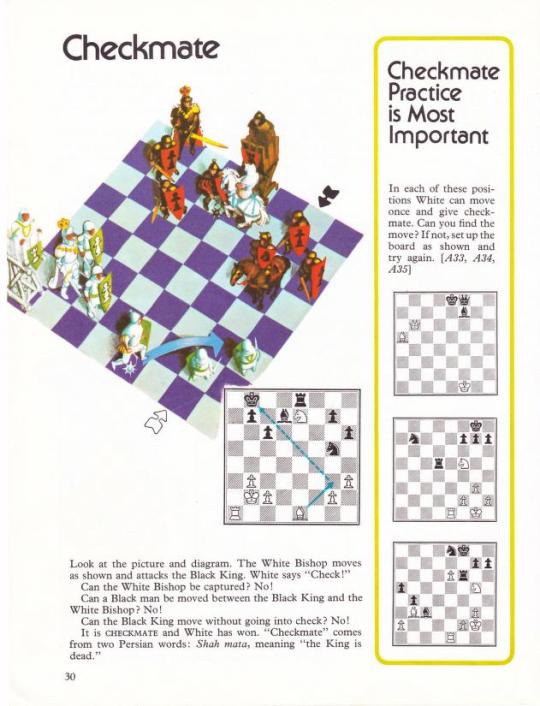
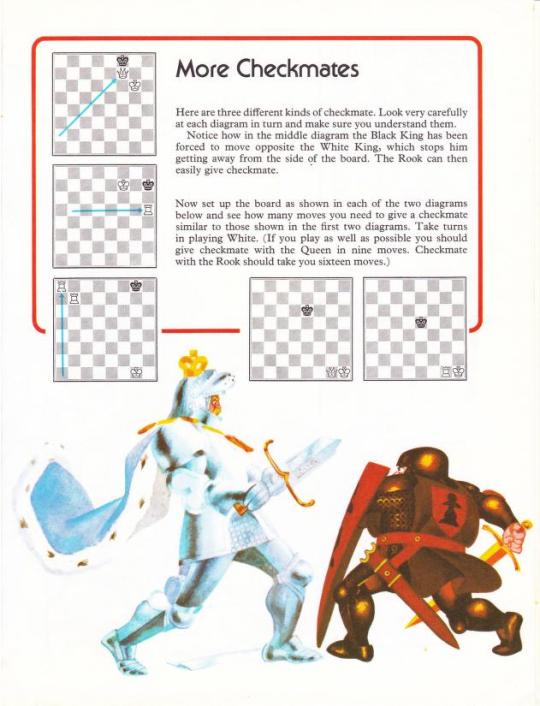
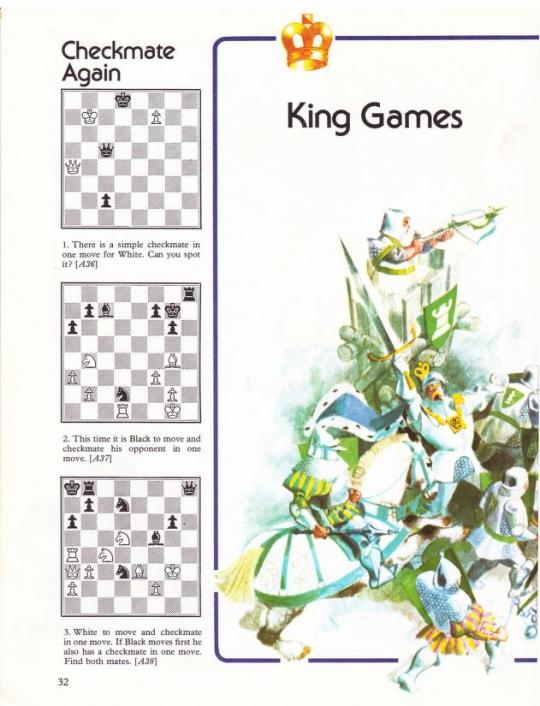





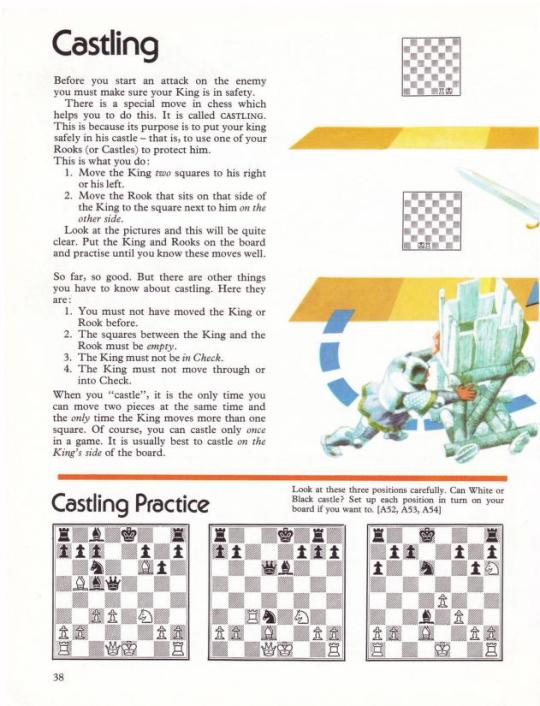
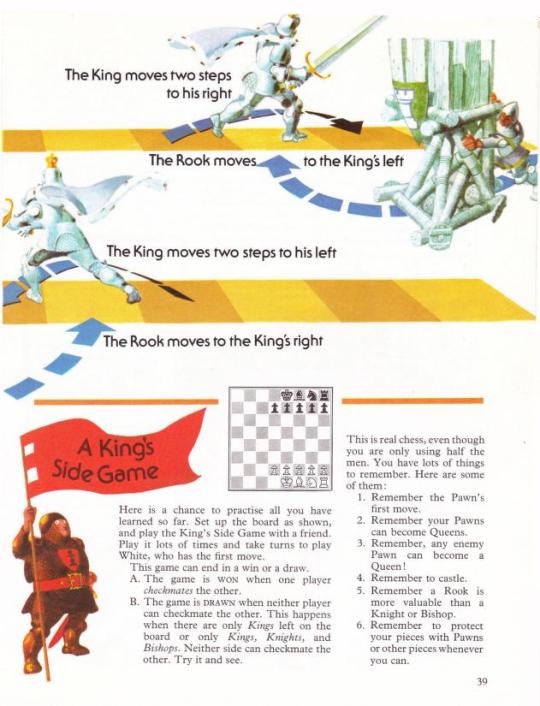
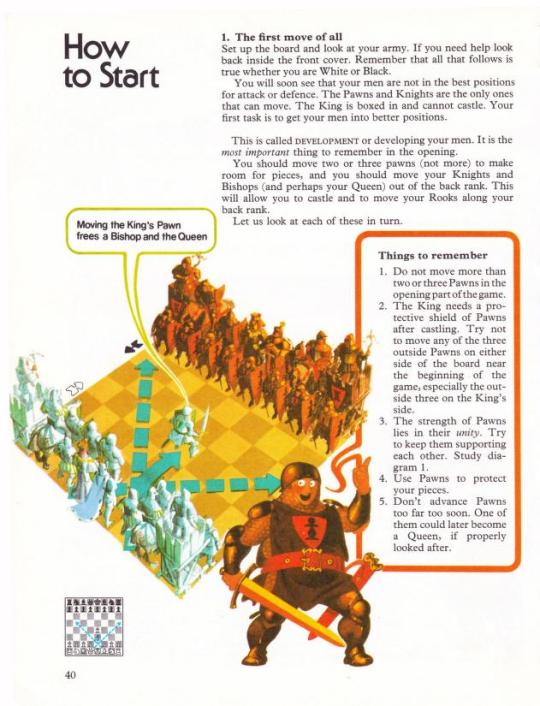
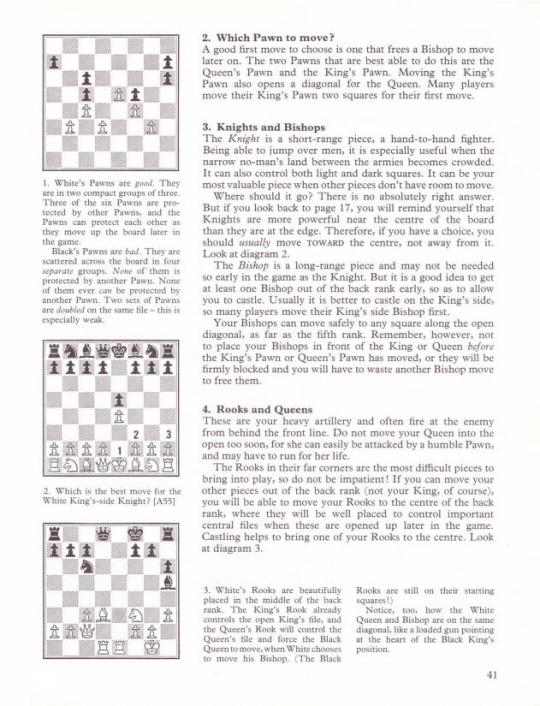
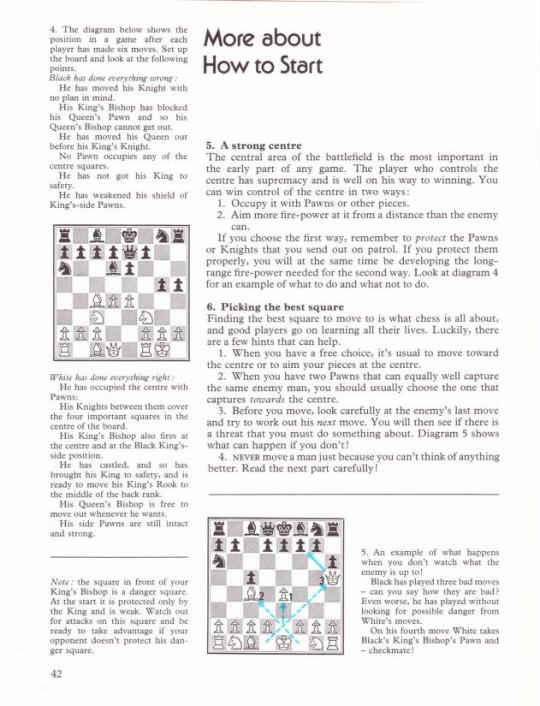

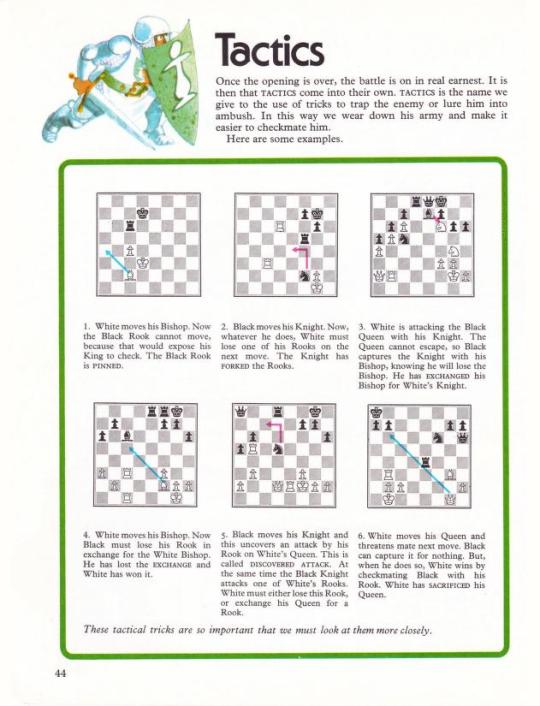
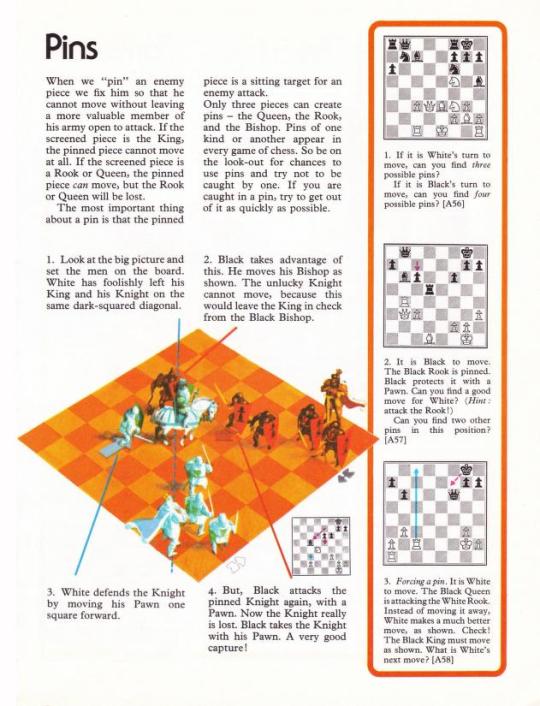
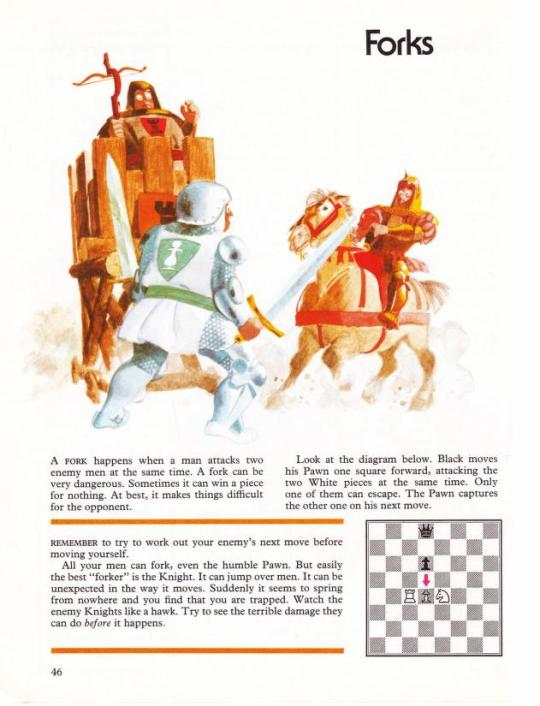
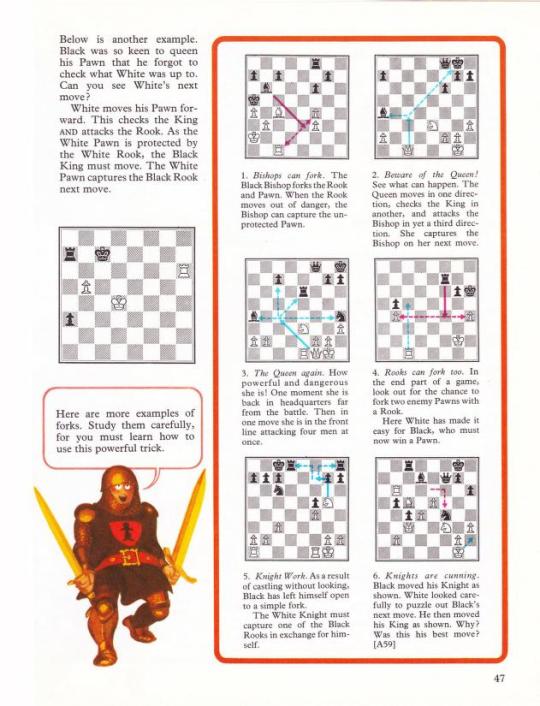


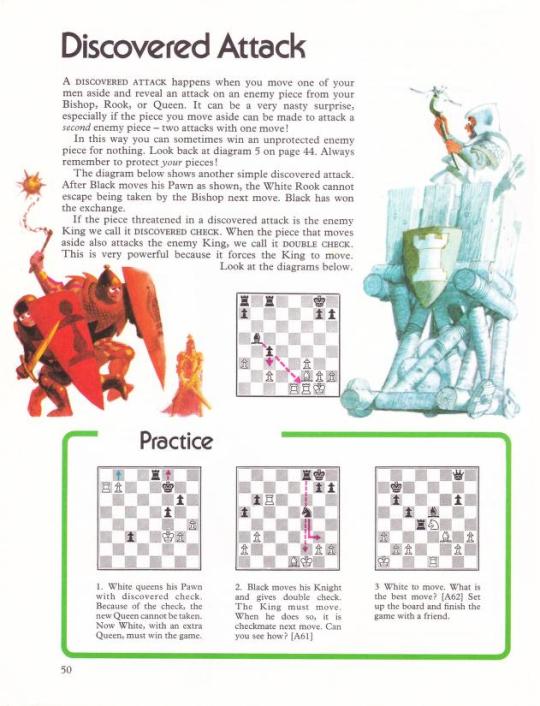
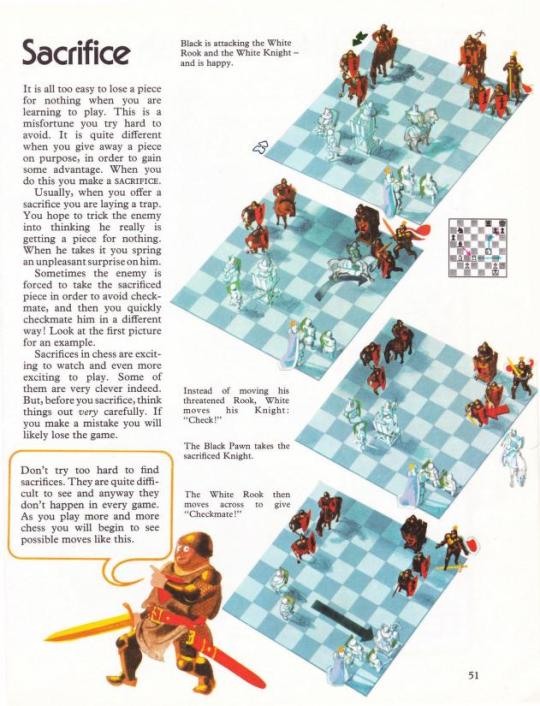


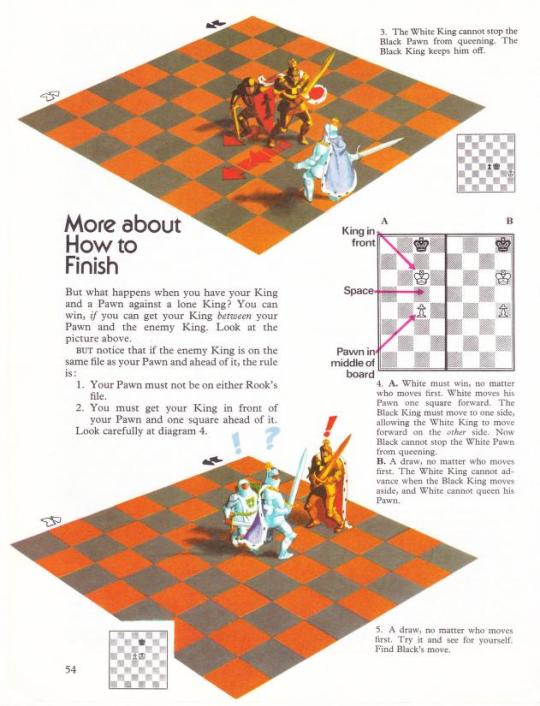
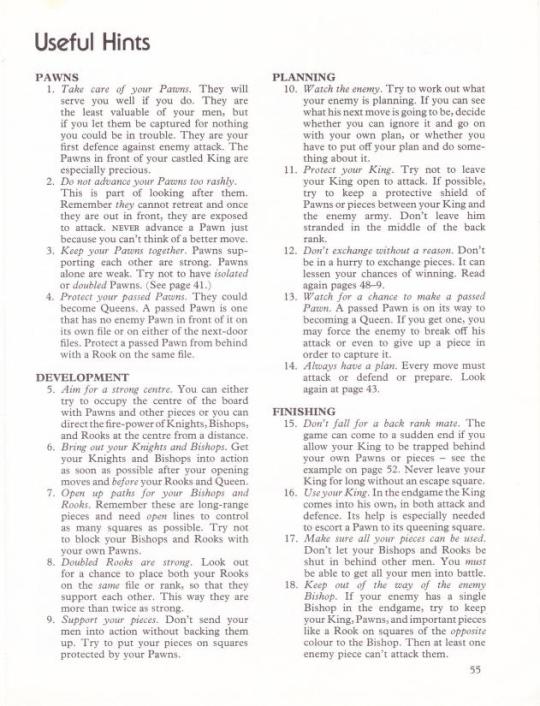
12 notes
·
View notes
Text
The Insanity of One's Mind
Episode Title: Treehouse Rules
Staring: . . .


> Characters mentioned/appear in the episode, that don't star in it, will be properly introduced in their respective episode.
______ . . . ______ . . . ______ . . . ______ . . . ______
In the windy day of January, a rickety treehouse, perched precariously on the town's biggest oak tree, groans against the wind. It told tales of numerous storms and winds survived, despite the obvious scorched spots in its walls. It suspiciously smells of burnt marshmallows and rubber tires. Upbeat, slightly off-key whistling can be heard from within the treehouse. Its inside is somewhat more polished than its exterior, but just as disorganized. Though, 'disorganized' couldn't be the word these two could use.
A wall is decorated by tacked-up posters of various fires and shoplifting targets and another is decorated by stolen road signs nailed with rusty nails. An crate, overflowing with a stack of flammable objects, sits on the left corner that has seen better days. A wooden table, its green paint fading away, is covered with newspapers dating back to 1970 and a collection of half-eaten candy bars organized by colors. Next to the table is a box closed by a monstrous amount of duct tape, labeled 'Fireworks (Do Not Touch, Seriously Tap)'.
In the center, a chess board stands on the edge of a whimsically carved stool, with odd mishmash pieces meticulously arranged, threaning to fall. Two figures sit in front of each on the sides of the chessboard, their dark and light brown fur and striped tails brighten by the morning sunlight. Tap is chewing on a matchstick perched on his mouth, his eyes squinted in concentration. His tail swings calmly from side to side, a habit he had since a young age. Tup is absentmindedly twirling one of the stolen road signs around, displaying a defaced 'STOP' sign that now reads 'WAVE!'. A plate of almost finished strawberry pastries laid on the floor, its sweet aroma twirling in the air, grabbing Tup's attention more than the game.
A blue, chipped bottle cap, carefully held by Tap's claws, intended to be his paw, hovered over the chessboard, ultimately landing on a square. Tap smirks, a small chuckle of victory escapes his lips, his eyes shining with stars. "Haha! Checkmake, brother!" He declares, his voice raspy from years of inhaling smoke. He plucks the matchstick from his mouth, pressed and dragged it along the wooden floor, lighting it. He plucks it back to his mouth. "Looks like your reign as champion is over."
Tup rolls his eyes, the defaced road sign slowing to a stop. "Beginner's luck. That's all it was. Your paw was clearly out of bounds. Rule 73, paragraph B, subsection 4; 'All paw movements must originate from within the player's designated sone'."
He knew it's a lie. He wrote the rule book himself, he knows what's inside it. He memorized every single line he put on the pages. "There's no rule like that!" Tap scoffs, moving a clawed finger to point at the chessboard. "You made that up!"
"Did not!" Tup retorts, slamming the road sign against the table, the pieces wobbling. "It's right here in the official Treehouse Rules of Chess!" He gestures vaguely towards a stack of papers balanced on a pile of stolen hubcaps.
"Those are instructions for my Rube Goldberg machine!" Tap exclaims, grabbing the papers and tossing them aside. A hubcap rolls off the pile, narrowly missing the crate labeled 'Fireworks'. "Seriously, Tup, get your facts straight for once!"
"Okay, maybe I misremembered the exact location of the rule." Tup concedes, a mischievous glint in his eyes. "But the spirit of the rule remains! Your move was illegal!"
"The only thing illegal around here is your obsession with bending the rules to your advantage." Tap retorts, leaning back in his stool with arms crossed, eyes narrowed. "You're just jealous because I finally beat you."
Tup stands up, knocking over his stool with a clang, hand on his chest. "Jealous? Please! I let you win. I was feeling generous." He moves towards to strawberry pastries.
"You? Generous? You're about as generous as a swarm of locusts!" Tap scoffs, snatching the last pastry from the plate before Tup can reach it. He shoves the whole thing into his mouth at once, crumbs scattering across his parka.
Tup's eyes narrow. "That was mine! I had my eye on that one!"
"Finders keepers." Tap mumbles through a mouthful of strawberry filling.
That was the last straw. Tup lunges for Tap, aiming for the pastry-filled mouth. A scuffle ensues, sending the table rocking back and forth. The chess pieces tumble to the floor, scattering across the room. The chessboard slides off the stool, crashing onto the floorboards with a loud thud. The defaced road sign clatters to the ground, the 'WAVE!' mocking their childish squabble.
"Get off me, you kleptomaniac!" Tap yells, trying to pry Tup off and shove him away.
"Give me back my pastry, you pyro!" Tup retorts, pulling and clawing at Tap's parka.
Their wrestling match careens through the treehouse, a chaotic dance of flailing limbs and angry snarls. They stumble against the pile of stolen hubcaps, sending them rolling across the floor like metallic tumbleweeds. Lost in their little fight, the twins don't notice the approaching footsteps — or rather stomping — from outside of the treehouse. They're jolted out of their argument when a harsh voice yells out.
"Hey! Keep it down up there, you jackasses!"
They pause their scuffle. The twins freeze, momentarily forgetting their pastry-fueled rage, they exchange nervous glances. Reluctantly, Tap moves over to the treehouse's entrance, only consisting of a trapdoor. He pries it open and look outside. Below on the ground, stands a tall figure dressed in his jammies. Skittles, the ever grumpy honey badger, his black and white fur ruffled and his eyes redder than they were yesterday. A rooster is held under his arm like a football. "Some of us are trying to sleep, you overgrown trash pandas!" Skittles continues to yell, his face turning an even deeper shade of crimson, a vein throbbing in his forehead. The rooster lets out a nervous cluck, flapping its wings weakly. "Dude, it's 11 AM. Why are you still in your pajamas?" Tap retorts, immediately regretting his smart-mouth remark. Skittles' glare intensifies.
"That's none of your fucking business! And it's because of you two that I can't get any sleep! The whole damn town can hear you fighting like a pair of rabid dogs!"
"We weren't fighting! We were... strategizing!" Tup yells from behind Tap, trying to salvage the situation.
Skittles raises a skeptical eyebrow. "Really? That sounded a lot like someone was about to lose a few layers of fur."
Tap sighs, running a paw through his fur. "Look, Skittles, we're sorry. We didn't mean to wake you up. We were just having a... spirited debate about the rules of chess."
Skittles scoffs, rolling his eyes. "I highly doubt that. Last time I checked, chess didn't involve throwing hands and yelling about pastries."
"Details, details." Tup mutters under his breath.
Skittles pinches the bridge of his nose, trying to calm himself down. "Just... keep it down, okay? I swear, if I hear another peep out of you two, I'm coming up there and make you regret the day you were born."
Tap and Tup exchange horrified glances. That was a threat they took very seriously. "Understood." Tap says quickly, giving Skittles a strained smile. "We'll be quiet as mice."
Skittles glares at them one last time before turning around and stomping back towards his house, muttering about inconsiderate neighbors and the eternal struggle for a decent night's sleep. His rooster lets out a relieved squawk as they disappear from view. Tap closes the trapdoor, leaning against it with a sigh. "Well, that was close."
Tup nods in agreement, a sheepish look on his face. "Maybe we should try to keep it down a little next time."
"Yeah." Tap says, surveying the chaotic scene around him. "And maybe we should clean up this mess before Skittles decides to pay us another visit."
______ . . . ______ . . . ______ . . . ______ . . . ______

#artists on tumblr#digital art#digital drawing#ibispaint art#writting#my writing#story#original story#my story#new series#my series#The Insanity of One's Mind#TIoOM#TIoOM Tap#TIoOM Tup#original ocs#ocs#my ocs <3#ocs story#ocs stuff#tw swearing#though not a lot :^
6 notes
·
View notes
Text
Kenshiro's Thoughts on Himeji Division

Nobuo Sone
"I know this guy's an actor, but that's about all I know about him. Whatever else I know comes from newspapers and news sites, not exactly a reliable way to judge someone, but enough to give me an idea of what kind of life he leads.
"Honestly? He's one of the reasons I have zero interest in being in the spotlight. It's not about fear, I could give a crap if people judge me or not. They've been doing that all my life, anyway.
"No, it's about the fact that the world is always watching, just waiting for you to slip up or do something that gives them a reason to make you out to be something you're not. Like I said, I couldn't care what they say about me, but no one in hell would I ever expose my daughters to something like that. Honestly, I don't know how Saeko puts up with it."
Bunko Ozaki
"This might come as something of a surprise, but I've always had an appreciation for strategy games. Chess, Go, backgammon, Othello, and of course, shogi. I really have always wanted to learn how to play, but between work and life, I've never had the time to sit down and actually learn. And honestly? I don't think I'd have the patience for it. Knowing me, I'd probably end up flipping the board within ten minutes.
"That's why I respect Bunko-san, learning shogi that young, becoming a champion, dedicating himself to it like that? That takes serious discipline. I've actually just started reading his second book, the beginner's guide. And while I know reading can't replace actually playing, it's good to get the basics down first. Who knows? Maybe I can get my daughters into the game. If nothing else, it'd be nice to have someone to play with."
Iwao Yoshioka
"I don't know this guy. I've never had much reason to take a train. In fact, I can't recall in recent memory ever getting on those things ever since I got my own ride, a 20XX Toyota Hilux, which I don't even really use much. Yamagata's got everything within walking distance, at least for me, so trains and cars aren't something I ever really think about. Still, it's good to know I have options.
"But you know what really gets me about this guy? His size. People always say I've got an intimidating build, but him? That's a whole different level. I didn't think I'd ever meet someone in my weight range, and yet, here he is."
YASHA
"I'll be honest: as famous as these guys are, at least in Nobuo and Bunko's cases, they don't really have much in common, less you count the controversies they had during their careers. Iwao-san seems to be the odd man out. I have to wonder how they all even came together. Speaking of which, it'll be interesting to see how they coincide. Whether they can hold together long enough to truly dominate is something only time will tell."
#hypmic#hypmic oc#hypnosis mic#hypnosis mic oc#hypnosis microphone#bishamon sentry#yamagata division#kenshiro sugi#himeji division#yasha#nobuo sone#bunko ozaki#iwao yoshioka
3 notes
·
View notes
Text
Chess For Young Beginners & Better Chess For Young Players (Books, William T. McLeod & Ronald Mongredien, 1975/1979)
Children's chess books featuring incredible art by Jean-Paul Colbus. You can read them here and here.
Thanks to Giannis Milonogiannis (@milonogiannis on Tumblr and musashinoelegy on Twitter).









#internet archive#book#books#kids book#kids books#kid's books#kids' books#childrens books#children's book#children's books#vintage children's books#chess#board game#board games#illustration#book illustration#1975#1979#1970s#1970's#70s#70's
36 notes
·
View notes
Text
I can remember when I was a little kid I was into chess like anyone else was, I enjoyed chess. and I remember once I was in the library at school and I found a book like "beginner chess theory" and I considered reading it and thought, nah, that's lame. and that's maybe the only thing I kick myself for. I could have been really good at chess by now if I had devoted myself to it from a young age. that's one thing my children will be doing for sure, playing chess, daily, I suck at chess it's shameful. I could probably beat someone who hasn't played very much but I don't know any of the tricks at all.
4 notes
·
View notes
Note
if your taking Munday questions, I'm sort of curious how you got into chess, you're probably the only serious chess player I've ever met
I learned chess when I was young but never really played it until elementary school, when I was old enough to join chess club. Before that, I remember an event one day at school where a bunch of tables with chess boards and sets were set up in the gym and we played chess against students from another school. I don't quite remember the year or the school. Another thing that happened once in a while: the teacher would put on this DVD by First Move, an organization that promotes teaching chess in school, and sure enough, the DVD was about setting up the pieces and how they move. Then we'd set up these small-sized First Move chess sets in the classroom and just play a few games. I remember this happening after I joined chess club and after I bought my first chess book, James Eade's Chess for Dummies (which I still have, and do recommend for beginners).
Yet another fun chess thing: Chess Magnet School, a website with a program that trained you on chess tactics, strategy, checkmate patterns, etc. that we would occasionally devote a day of Technology class too. Naturally I took it the most seriously and had a much higher rank than anyone else in the class. Even so... I wasn't actually good as a kid, it's just that most of my peers just didn't know any chess at all, so I usually had a large advantage over them. Against kids from other schools who knew what they were doing... I hardly had a chance. Anyways, I have to say, despite reading a bunch of chess books and stuff, I never really got... good at chess. Chess club was nothing more than just playing games against each other; we never really learned anything from our coach. Right, we had a coach, but I think that he took coaching kids from another school with stronger chess players in general more seriously, and... he's old and is stuck on a plateau with his rating now. Anyways... that lasted until eighth grade. Sadly, my high school didn't have a chess club, and while my university did, they rarely met—and then the pandemic happened. Apparently they did get back into holding meetings and tournaments, but I never heard anything about them, so I had no idea; and I must have been too occupied with other things to bother looking around.
Of all my chess phases I consider this one the most serious. Now I think that I actually know what I'm doing and that I have a shot at major improvement. I just need to have confidence in myself. Perhaps I'm a bit too old at 22, compared to all the chess prodigies out there nowadays, but we'll see how I get on.
1 note
·
View note
Text
The Silent Skill-Builder: How Chess Improves Kids Without Them Realizing It

More than just a hobby, chess is a quiet skill development tool that shapes young brains, usually overlooked by the players. Children enjoy the excitement of outmaneuversing their rivals and unconsciously acquire priceless life skills that support their academic, social, and emotional development.
Among the main benefits of chess are enhancement of cognitive ability. Children pick their critical thinking and decision-making abilities by seeing behaviour, organising, and problem-solving techniques. Operating both sides of the brain, these mental drills boost memory, reason, and spatial awareness. Regular chess players excel in fields including science and arithmetic because of their higher concentration and problem-solving ability.
Apart from the classroom, chess has important lessons for life. Children develop patience from waiting for the appropriate response and their attention span grows. This behaviour supports discipline and self-control, not only in the classroom but also in daily life. Above all, chess sharpens emotional intelligence. Children experience both achievement and grief; they also develop to be strong and sophisticated in their emotional regulation.
competitively among classmates. Children's communication and teamwork abilities grow as they participate in friendly games and team sports. While losing presents chances for self-evaluation and development, winning a game boosts confidence.
Parents and teachers can help to make chess readily available by using kid-friendly chess apps, registering children in beginning programs, or starting chess clubs at their neighbourhood schools. Maintaining long-term attention calls for making the experience appropriate for their age, straightforward, and enjoyable nature. Chess should be pleasant and fascinating, not challenging or intimidating.
Chess is, all things considered, a lifetime gift. It generates driven students, confident people, and sharp thinkers. Playing chess helps kids be ready for life, not only for a game.
♟️ Ready to unlock your child’s potential? Start their chess journey at Time2chess today with expert guidance and fun learning! 📱 Join our beginner-friendly classes and see the change in just weeks. 🎯 Book a free demo class now – let the smart moves begin!
0 notes
Text
Understanding Reinforcement Learning: A Beginner’s Guide for Curious Minds
In today’s fast-moving world where technology is changing the way we live, work, and communicate, the term “Artificial Intelligence” or AI has become quite popular. From voice assistants like Alexa to recommendation systems on Netflix, AI is all around us. But within AI, there’s a very interesting and powerful branch called “Reinforcement Learning” or RL. It might sound a bit technical at first, but once you understand it, you’ll realize how impactful and exciting it truly is.
Especially for young students, tech enthusiasts, and working professionals in India, understanding reinforcement learning can open new career paths and give better clarity about how machines are learning to make decisions on their own.
What is Reinforcement Learning?
Reinforcement Learning is a type of machine learning where an agent (basically a computer program) learns to make decisions by interacting with an environment. Just like how humans learn from experiences — by trying, failing, and trying again — machines also learn from trial and error in reinforcement learning.
Imagine you are training a puppy. When the puppy sits on command, you give it a treat. When it jumps on the sofa, you say “no”. Over time, the puppy learns what is good behavior (which gives it rewards) and what is bad behavior (which leads to punishment or no reward). Reinforcement learning works in a very similar way.
In this setup, the “agent” (machine or software) takes “actions” in an “environment” and receives “rewards” or “penalties”. The goal of the agent is to learn a strategy or policy that maximizes the total reward over time.
How Does Reinforcement Learning Work?
Let’s break down the process of reinforcement learning into simple steps:
The agent observes the current situation or state of the environment.
Based on that, it takes an action.
The environment responds by moving into a new state and gives a reward (positive or negative).
The agent updates its knowledge based on this reward.
The process continues until the agent learns the best way to act.
A classic example used in teaching reinforcement learning is a robot in a maze. The robot must find the way out. Each time it hits a wall, it gets a small penalty. When it reaches the exit, it gets a big reward. Over time, by trying different paths, the robot learns the best way to get out of the maze with the least mistakes.
Why is Reinforcement Learning Important Today?
In the Indian context, technology is reaching every corner — from urban cities to rural villages. Whether it’s smart farming, online education, or digital healthcare, AI is slowly making a difference in our lives. Reinforcement learning is at the heart of some of the most advanced applications of AI. Here’s why it matters:
It helps in developing intelligent systems that can make decisions on their own.
It is useful in solving real-world problems where human decisions are too slow or impossible.
It can improve automation in sectors like agriculture, manufacturing, transport, and even medicine.
It is pushing innovation in areas like robotics, self-driving cars, and game playing AI (like how Google’s DeepMind beat human champions in games like Go and chess).
For example, in India, where we face challenges in agriculture productivity and efficient transportation, reinforcement learning could help build automated systems that optimize farming techniques or traffic management in crowded cities.
Applications of Reinforcement Learning You Might See Around You
Reinforcement learning is not just for scientists or researchers. Many of its applications are slowly becoming part of our everyday life. Let’s look at some real examples:
Self-driving cars – Companies like Tesla use reinforcement learning to train their cars to drive safely, follow rules, and avoid accidents. In the future, similar technology can help manage auto rickshaws or delivery drones in Indian cities.
Personal assistants – Google Assistant or Amazon Alexa can improve their responses over time by learning what answers make you happy and what don’t. They use RL techniques to learn from feedback.
Healthcare – Reinforcement learning is being used to help in personalized medicine, where treatment plans are adjusted over time based on how well the patient is responding.
Education – In online learning platforms like BYJU’s or Vedantu, RL can help personalize your learning path by suggesting questions or topics you need more practice on.
Finance – Apps that help you invest or save money use RL to find the best decisions for you based on your financial goals and market conditions.
Gaming – Games like PUBG, Free Fire, and even chess engines use reinforcement learning to train bots that play better against humans.
Opportunities for Students and Tech Enthusiasts in India
Reinforcement learning might sound complex, but thanks to online resources, anyone with basic programming skills can start learning it. Students in India who are studying computer science, engineering, mathematics, or even commerce can explore this field.
Free resources like YouTube tutorials, courses on Coursera, edX, Udacity, and even free Python notebooks on platforms like Kaggle and Google Colab can help you get started.
Moreover, if you’re into coding competitions or hackathons, you’ll find many challenges related to reinforcement learning. Indian platforms like HackerEarth and TechGig are great places to test your skills.
Also, many Indian startups in fintech, edtech, and healthtech are exploring RL. So, learning it can also increase your job and internship opportunities.
Challenges and the Way Forward
While reinforcement learning is very powerful, it also comes with some challenges. It often needs a lot of data and computing power. Training an agent to learn the best policy can take a long time. Also, in some situations, a wrong decision by the machine can have serious consequences (like in medical diagnosis or traffic control).
That’s why researchers and developers are still improving the technology. However, as computer hardware becomes cheaper and internet access improves across India, reinforcement learning will become easier to apply even in small startups or college projects.
The Indian government and educational institutions are also taking steps to include AI and machine learning in their curriculum, which will boost awareness and research in reinforcement learning.
Conclusion: Why You Should Care About Reinforcement Learning
Whether you’re a student, a working professional, or just someone curious about AI, reinforcement learning is worth understanding. It is one of the most exciting and fast-growing fields in artificial intelligence.
In a country like India, where we are dealing with unique and large-scale problems, reinforcement learning can offer smart solutions that adapt and improve with time. It can bring innovation in farming, improve traffic in our cities, personalize our education, and even assist our doctors.
Most importantly, it opens doors to a new way of thinking — where machines don’t just follow orders, but learn to make better decisions just like humans.
So, the next time you hear about AI beating a human in chess, or a robot helping a farmer sow seeds in Bihar, you’ll know that reinforcement learning might be behind it — helping machines learn, grow, and become smarter.
Visit us Deal Acres.
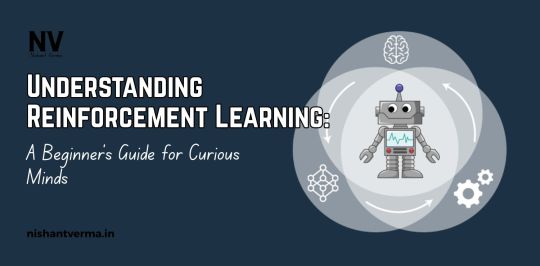
0 notes
Text
Why Online Chess Training is Perfect for Kids & Young Learners

In today’s fast-paced digital age, parents are constantly looking for meaningful and enriching ways to engage their children. While video games and social media may dominate screen time, there’s a growing trend that’s not only fun but also incredibly educational-online chess training for kids.
Whether your child is a complete beginner or already showing sparks of strategy, chess coaching for young learners has emerged as a powerful tool for building critical life skills. From improving concentration to enhancing problem-solving abilities, the game of kings is now transforming the minds of young players across the globe-and it’s all happening from the comfort of their homes.
With expert guidance from professionals like FIDE Instructor Dhanesh Shrikhande, many children are experiencing how virtual chess classes for beginners can lay the foundation for lifelong success. So, let’s explore why online chess training for kids is more than just a trend-it’s a smart investment in your child’s future.
The Rise of Online Chess Training for Kids
Thanks to technology, the world of chess is no longer confined to traditional clubs or expensive coaching centers. Online chess training for kids is accessible, flexible, and incredibly effective. Today’s platforms offer fun and interactive chess lessons designed specifically to keep children engaged, entertained, and constantly learning. Moreover, with platforms now offering affordable online chess training for young learners, families across different regions can provide quality chess education to their kids without financial strain.
1. Why Chess Coaching for Young Learners Matters
There’s a common misconception that chess is too complex for children. But research says otherwise. In fact, chess coaching for young learners helps build a structured approach to thinking-something that benefits them far beyond the 64 squares.
Here’s how it helps:
Develops patience and persistence
Enhances cognitive flexibility
Improves academic performance
Strengthens memory and retention
With coaches like FIDE Instructor Dhanesh Shrikhande, kids don’t just learn the game-they absorb its underlying philosophies that shape sharp thinkers and strategic decision-makers.
2. Benefits of Chess for Children: More Than Just a Game
The benefits of chess for children go far beyond knowing how to checkmate an opponent. Studies have shown that children who play chess regularly demonstrate:
Stronger math and reading skills
Better problem-solving capabilities
Higher levels of concentration and discipline
3. Virtual Chess Classes for Beginners: Learning Made Easy
One of the biggest advantages of virtual chess classes for beginners is the ease of learning at one’s own pace. Children can:
Re-watch recorded lessons
Practice with AI-powered tools
Engage in real-time matches with peers
Receive instant feedback from coaches
This format ensures that no child is left behind and every student gets personalized attention-especially when guided by experts like FIDE Instructor Dhanesh Shrikhande.
4. Chess and Brain Development in Young Learners
Chess is like a gym for the brain. Regular participation in online chess training for kids can significantly improve brain function. Some neuroscience-backed benefits include:
Enhanced spatial reasoning
Improved memory retention
Better planning and foresight
Strengthened analytical thinking
Yes, chess and brain development go hand-in-hand and starting young amplifies these effects.
5. How Chess Improves Critical Thinking in Kids
Every move in chess requires evaluation, planning, and strategy. Through chess coaching for young learners, children develop the ability to:
Anticipate consequences
Think several steps ahead
Analyze multiple possibilities
Make logical decisions under pressure
This is why how chess improves critical thinking in kids is a key topic discussed in educational psychology today.
Continue Reading: https://chesstrainer.com/why-online-chess-training-is-perfect-for-kids-young-learners/
#Online chess training for kids#Chess coaching for young learners#Benefits of chess for children#Virtual chess classes for beginners#Kids chess programs online#Cognitive benefits of chess#Best online chess courses for kids#Chess and brain development#Fun and interactive chess lessons#Improving problem-solving skills through chess#Why online chess training is great for children#How chess improves critical thinking in kids#Best platforms for kids to learn chess online#How online chess classes boost focus and memory#Affordable online chess training for young learners
0 notes
Text
How Chess Enhances Critical Thinking for Students

In today's fast-paced world, students are constantly bombarded with distractions that can hinder their ability to concentrate and make rational decisions. One of the most effective yet underrated tools to boost mental clarity, improve focus, and sharpen decision-making skills is the timeless game of chess. Far more than just a board game, chess acts as a mental gymnasium, significantly enhancing critical thinking skills in students.
What Is Critical Thinking?
Critical thinking refers to the ability to analyze facts, evaluate evidence, and make reasoned judgments. It involves observation, reflection, interpretation, and problem-solving — skills that are vital for academic success and everyday decision-making.
How Chess Builds Critical Thinking
1. Strategic Planning and Foresight
In chess, players must think several moves ahead, anticipating their opponent’s strategy while formulating their own plan. This encourages strategic thinking, where students learn to weigh multiple outcomes before acting — a crucial skill for tackling real-life problems.
2. Improved Concentration
A chess match demands full attention and focus. Students quickly learn that one lapse in concentration can lead to defeat. This trains their minds to stay present, which is a valuable habit for studying, exams, and other academic pursuits.
3. Problem Solving Under Pressure
Every game of chess presents new challenges. Players must solve complex problems under time constraints, helping them develop the confidence and agility to think clearly under pressure — a skill directly transferable to school tests, debates, and group projects.
4. Decision-Making and Consequence Analysis
In chess, each move has consequences. Students learn to evaluate the risk vs. reward of every decision, leading to improved judgment and a more analytical mindset.
5. Pattern Recognition
Chess enhances a student’s ability to recognize patterns, which is key in subjects like mathematics, coding, and science. Over time, they become quicker at spotting tactics and threats, strengthening both their memory and analytical skills.
6. Encouraging Patience and Discipline
Chess is not a game of luck. It requires discipline, patience, and perseverance — traits that contribute to a more mature, well-rounded character.
Real-Life Benefits of Critical Thinking in Students
Students who play chess regularly tend to:
Scientific Backing
Numerous studies across the globe have proven that students who engage in chess show a marked improvement in cognitive skills. According to research by the American Chess Foundation, students who played chess scored significantly higher on standardized tests compared to their peers.
Final Thoughts
Introducing chess into a student’s routine is like gifting them a mental toolkit for life. At Maestro Chess Academy, we specialize in nurturing young minds through personalized chess coaching. Whether your child is a beginner or aiming to compete in tournaments, our structured curriculum and experienced coaches are here to support their journey.
✅ Ready to Elevate Your Child’s Thinking Skills?
Join Maestro Chess Academy’s Online or Offline Classes Today! ✔️ Tailored for All Age Groups ✔️ Focused on Critical Thinking and Competitive Growth ✔️ Taught by FIDE-rated Coaches
📞 Call Now: +91 7406577878 🌐 Visit: www.maestrochessacademy.com 📩 Book a FREE Trial Class Today!
0 notes
Text
chess for young beginners by william t. mcleod, ronald mongredien, jean-paul colbus, 1975
pt. 1

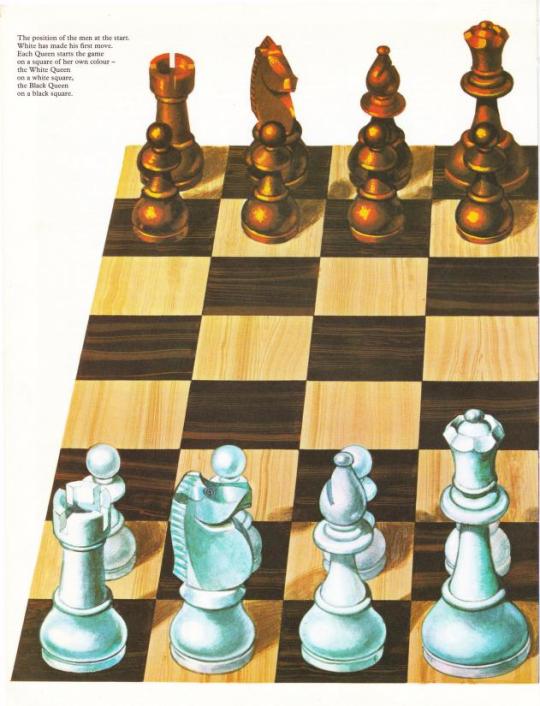
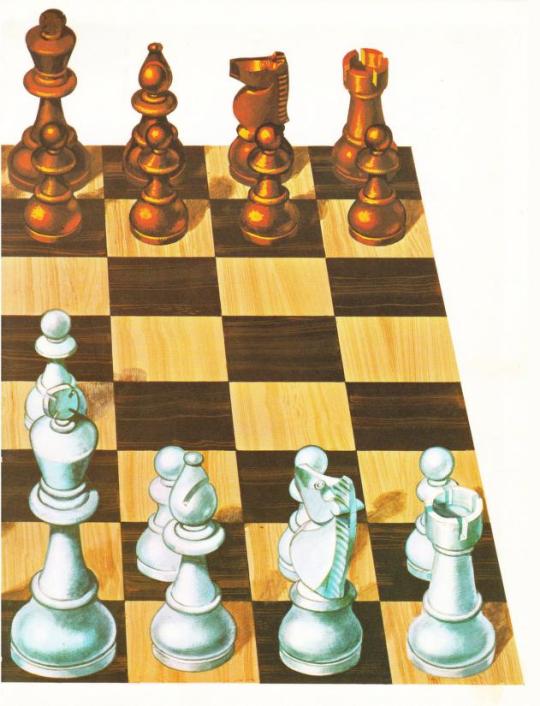


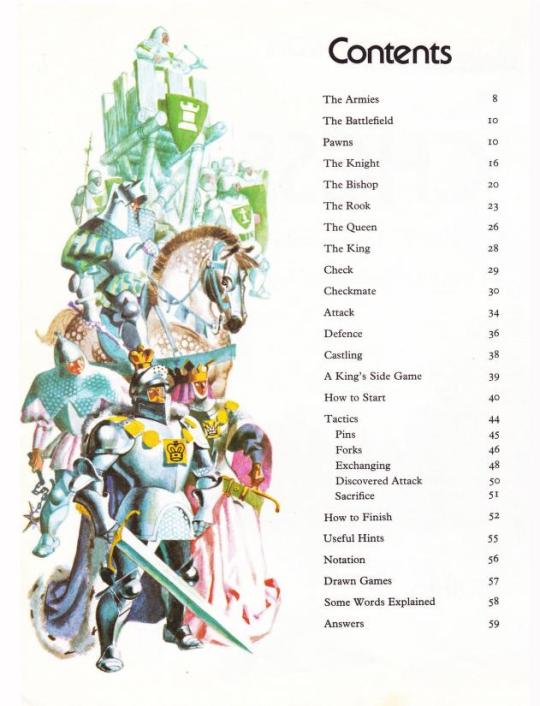
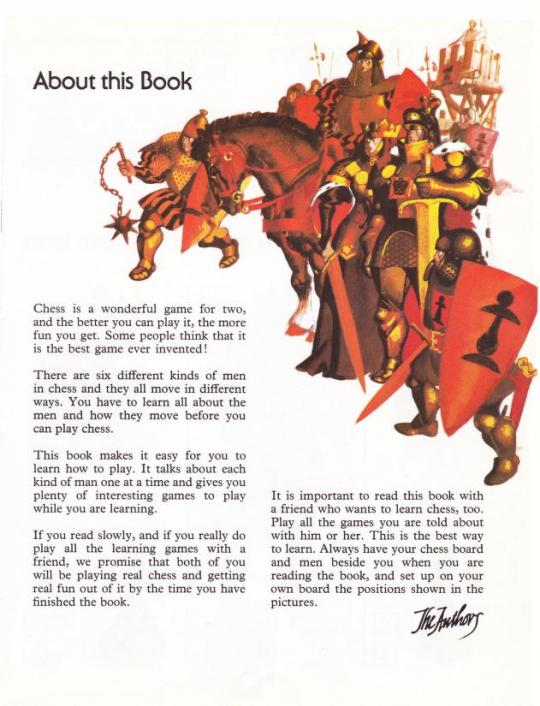
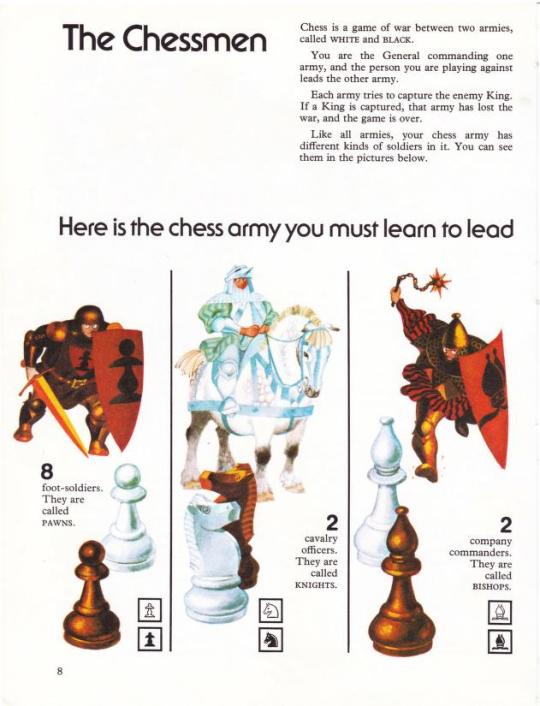

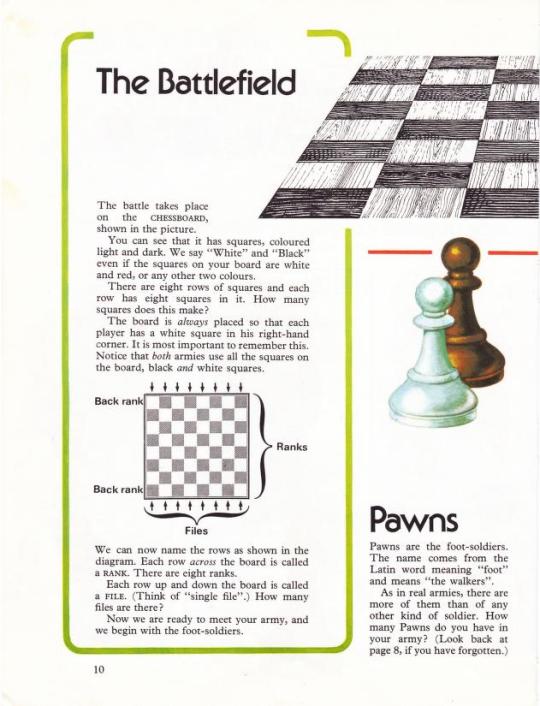
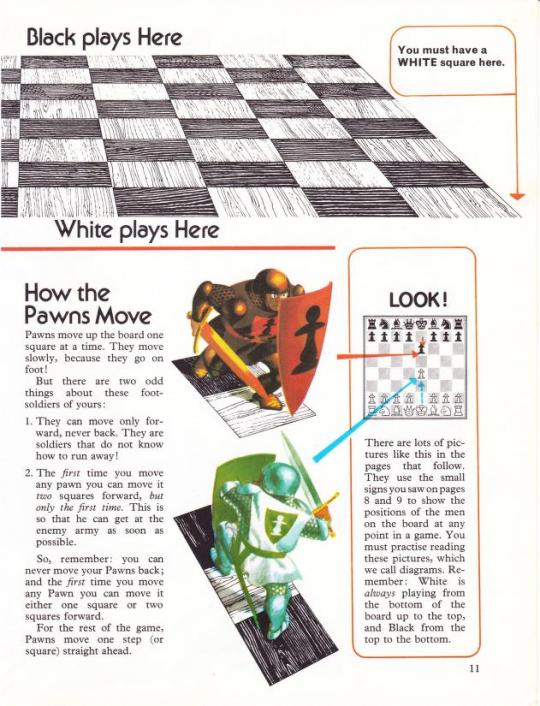
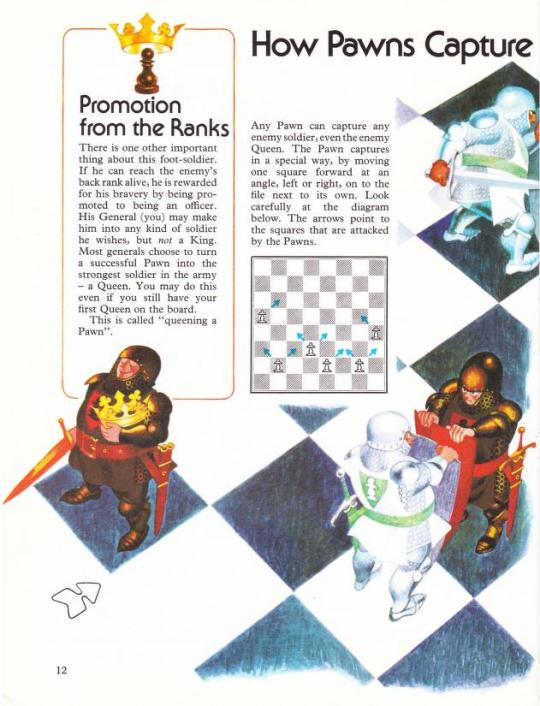
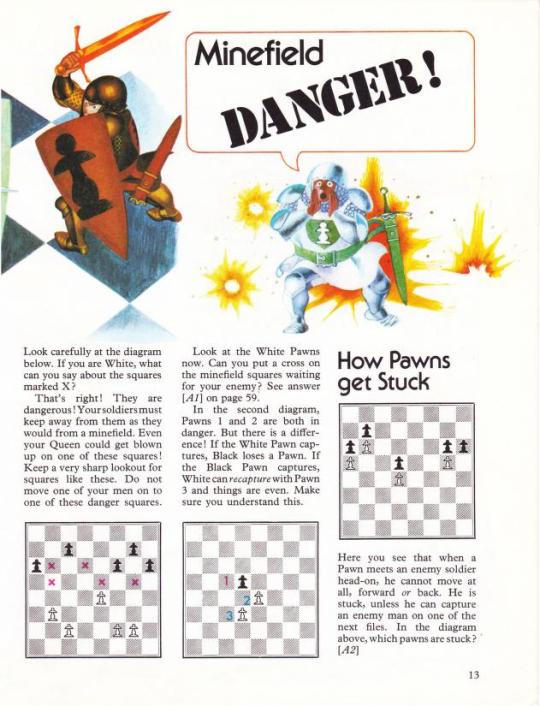
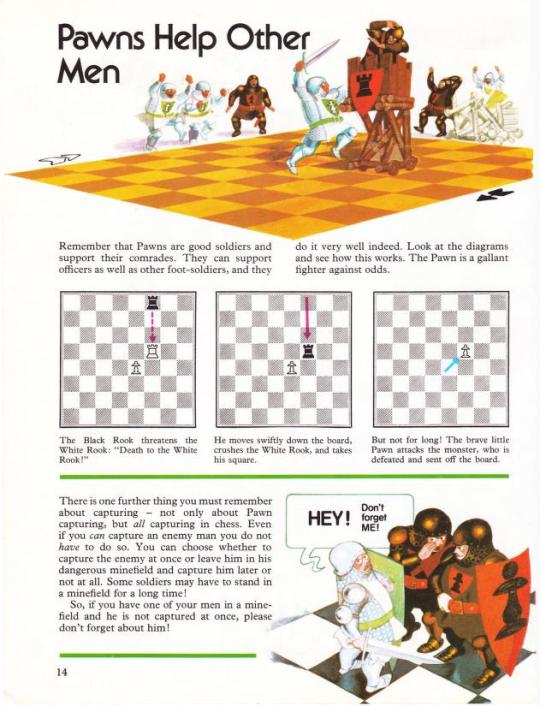


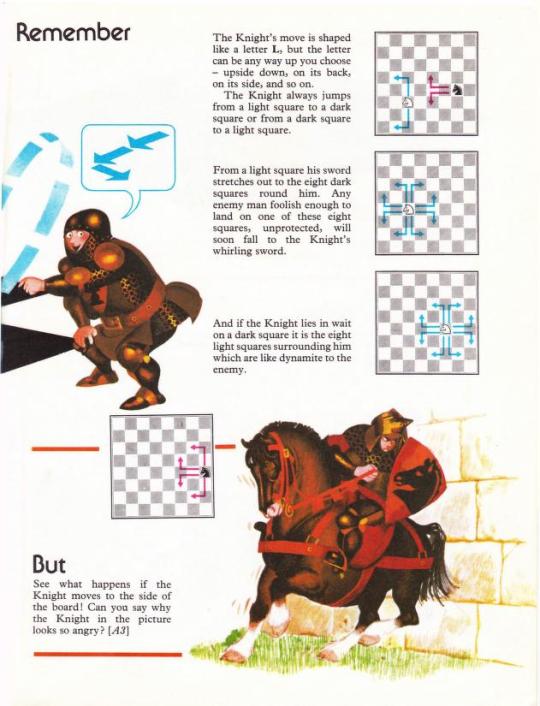
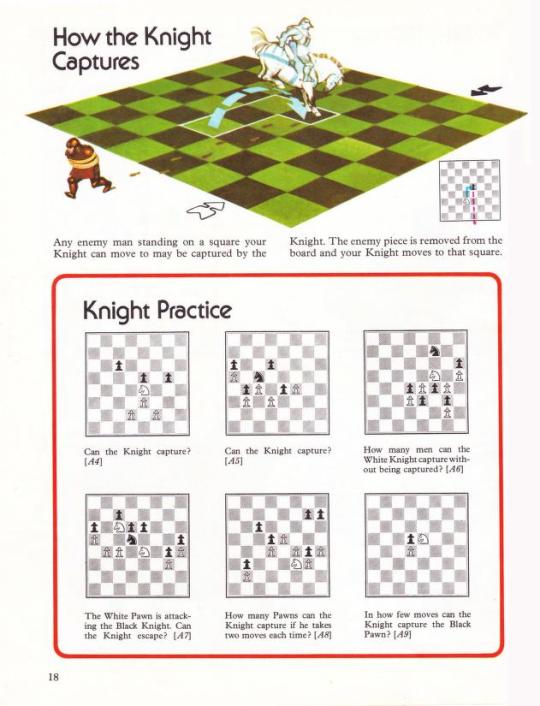

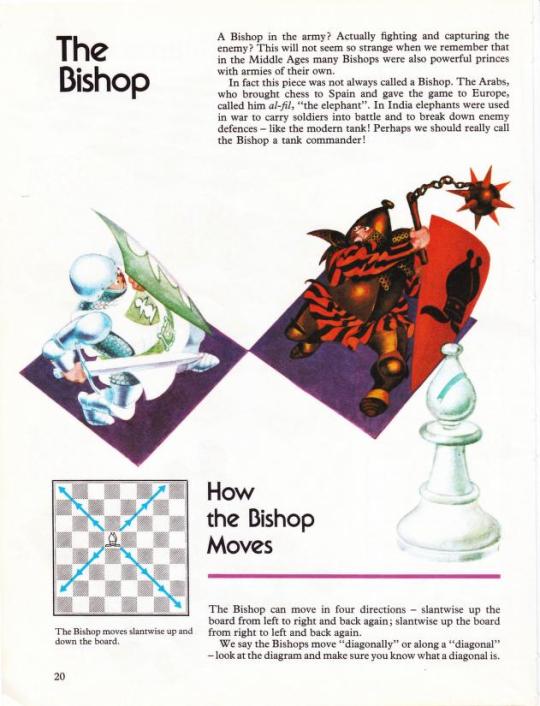

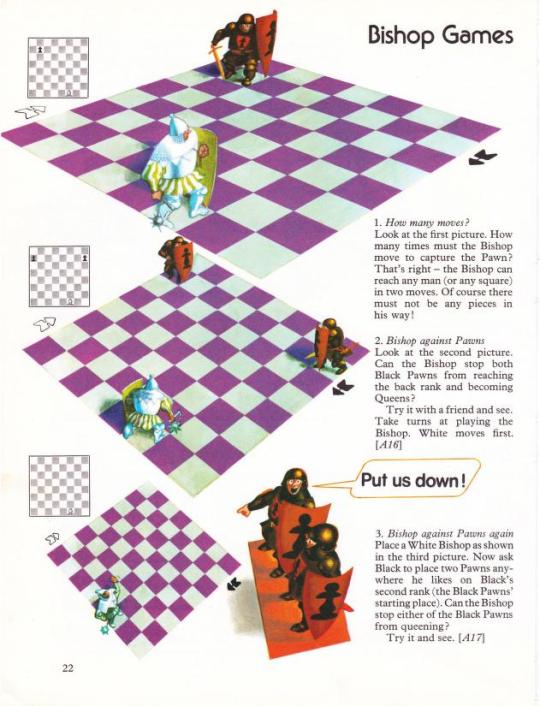
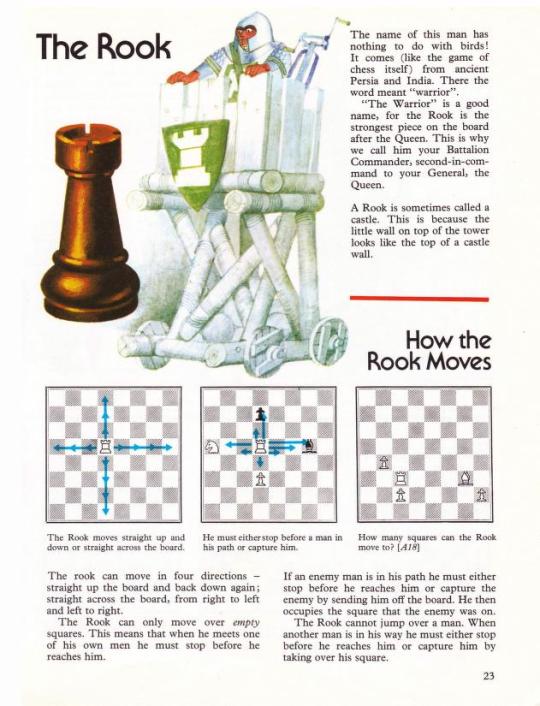
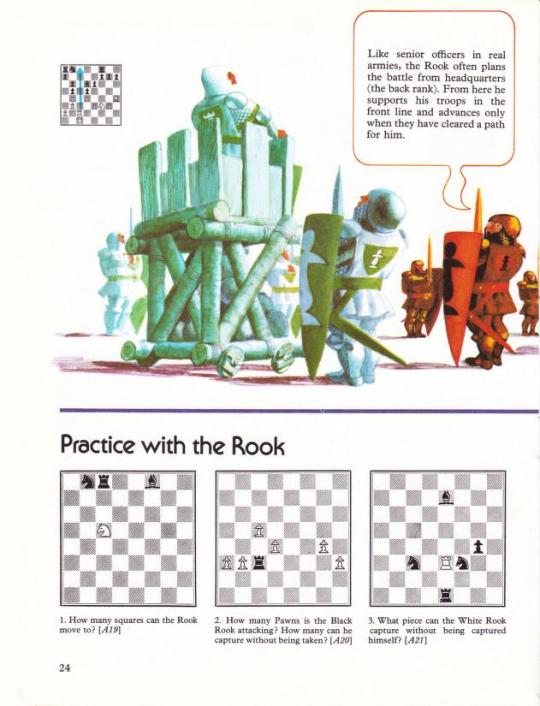

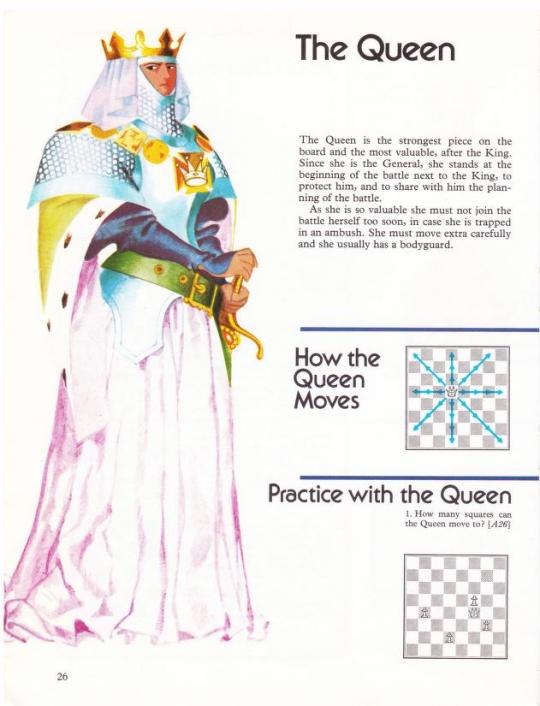
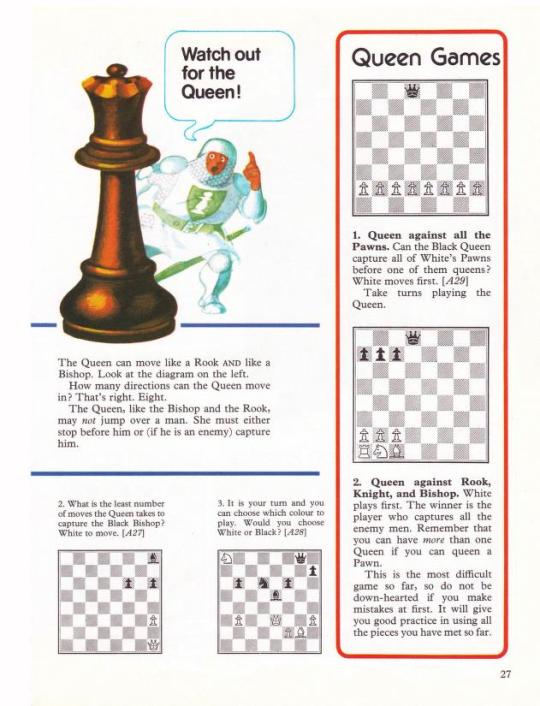


the art of sketch and explanation.
9 notes
·
View notes
Text
https://kiyalearning.sg/chess-in-kampong-sungai-jurong/
Chess Classes in Kampong Sungai Jurong
Unlock your child’s strategic thinking with engaging chess classes in Kampong Sungai Jurong by Kiya Learning! Our expert coaches make learning chess fun, building focus, patience, and problem-solving skills. Whether beginner or advanced, each child receives personalized attention. Enroll today with Kiya Learning and watch your young learner grow into a confident, smart chess player!
#ChessClassesSingapore#LearnChessSG#ChessForKidsSG#SingaporeChess#ChessTrainingSG#ChessLessonsSingapore#ChessAcademySG#ChessClubSG#ChessForBeginnersSG#ChessMastersSG
0 notes
Text
Master the Board: Unlock Your Chess Potential with Expert-Led Classes at Delighted Champs
Chess is one of those things that lights up a kid's mind. It's not just about moving pieces around—figuring out puzzles, thinking a step ahead, and feeling like a champ when you make a smart move. At Delighted Champs, our chess classes are all about helping kids fall in love with the game, whether they're just starting or already dreaming of winning tournaments. We're here to make chess fun, easy to learn, and something your kid will carry with them for years.

Why Choose Chess at Delighted Champs?
Kids are all different, and we get that. Our classes are built to meet your child where they're at, mixing fun games, simple lessons, and real-time coaching. Whether your kid's learning how a rook slides across the board or trying out a clever checkmate, we make it exciting and keep them wanting more. Our coaches create a friendly space where kids can mess up, try again, and feel proud of every step they take. It's all about sparking their curiosity and building their confidence.
What We Offer
Our chess program is designed to help your kid grow while keeping them hooked. Here's what they'll get:
Beginner to Advanced Levels: Whether your kid's new to chess or playing in school matches, we've got a class that fits.
Live Online Sessions: Your child learns straight from coaches who give personal tips and keep the group vibe fun.
Practice + Play Approach: We mix short lessons with actual games, so kids can immediately try out their new moves.
Monthly Assessments: We check in to see how your kid's doing and help them prepare for school chess clubs or bigger events.
Flexible Scheduling: Pick times that work for your family, like after homework or on a chill weekend.
Every class is packed with puzzles, matches, and feedback that feels like it's just for your kid.
Skills That Go Beyond the Game
Chess is more than just capturing pieces—it's a way to help your kid shine in life. As they play, they'll naturally get better at:
Logical and analytical thinking: Figuring out what move comes next helps with school projects and challenging problems.
Patience and focus: They'll learn to slow down and think, even when the game gets tricky.
Decision-making under pressure: Chess teaches them to make wise choices, even in a pinch.
Sportsmanship and discipline: Win or lose, they'll learn to shake hands, keep trying, and play fair.
These are the kinds of skills that help with math homework, group projects, or even just getting along with friends.
A Community of Young Thinkers
Delighted Champs isn't just about learning chess—it's about joining a crew of kids who love it, too. We run fun in-house tournaments and group challenges where your kid can show off their moves and make new buddies. If they're eyeing bigger competitions, like school or national chess events, our coaches step in with extra tips, game replays, and strategies to help them feel ready and confident.
Enroll Today and Make the First Move
Chess with Delighted Champs is a no-brainer, if you want something fun that boosts your kid's brain and helps them grow. Contact Us and watch your kid light up with every smart move they make.
0 notes